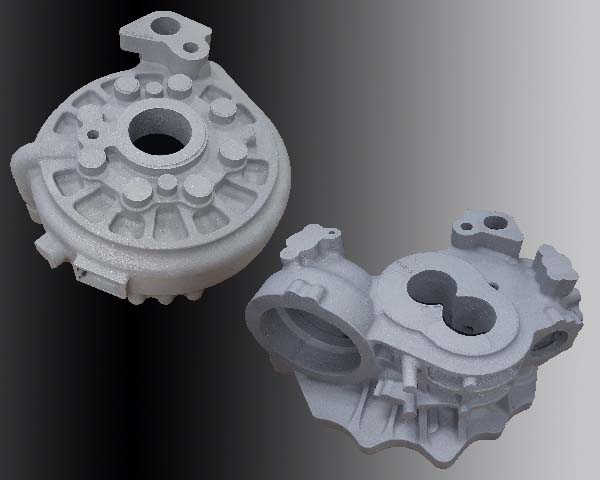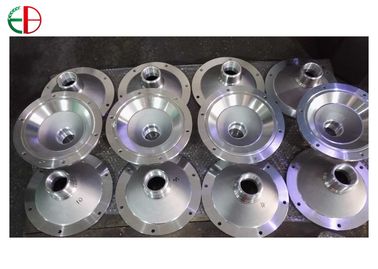The Effect of Innovative Factory Providers on Lasting Manufacturing Practices
Ingenious factory services play an essential function in progressing lasting manufacturing techniques. By incorporating reusing modern technologies and energy-efficient processes, these solutions significantly decrease environmental effect. Factories can redeem useful materials, thereby reducing reliance on virgin sources. As automation and lean production concepts get traction, production performance is enhanced. The full level of these innovations and their effects for the future of producing stay to be explored.
The Duty of Advanced Recycling Technologies in Foundries
Advanced reusing modern technologies are changing the landscape of foundries by boosting product healing and reducing waste. These innovative processes allow factories to reclaim beneficial steels and materials from scrap, reducing dependence on virgin resources. By integrating sophisticated sorting, shredding, and melting techniques, foundries can effectively extract useful materials from discarded items, thus promoting a round economy.
These innovations support the manufacturing of high-quality alloys and components, making sure that recycled materials fulfill rigid industry criteria. As a result, foundries are not only improving their material performance but likewise decreasing the environmental influence connected with traditional production approaches
This shift towards progressed recycling not only strengthens economic stability for shops however also lines up with international sustainability objectives. Inevitably, the incorporation of these modern technologies represents a considerable advance in the quest for sustainable production practices within the shop market.
Power Efficiency: Lowering Usage in Production Processes
Power effectiveness in making processes is essential for lasting operations. Approaches such as procedure optimization strategies, sustainable energy integration, and waste warmth recovery play vital duties in decreasing energy usage. By focusing on these areas, suppliers can significantly decrease their ecological effect while enhancing performance.
Process Optimization Techniques
A significant variety of manufacturing facilities are increasingly embracing process optimization strategies to enhance power efficiency and minimize intake. These methods entail assessing and improving production operations, recognizing bottlenecks, and implementing automation to simplify procedures. By leveraging data analytics, makers can check energy use in real-time, allowing positive changes to reduce waste. Strategies such as Lean Production and 6 Sigma emphasis on enhancing and getting rid of inefficiencies resource allowance. Additionally, advanced modern technologies like Web of Points (IoT) sensing units provide insights into equipment performance, helping with predictive maintenance that prevents power loss. Overall, these process optimization methods not only add to decreased power consumption yet also promote a society of constant enhancement within producing environments, lining up operational experiment sustainability objectives.
Renewable Resource Integration
Several production centers are progressively incorporating renewable power resources to enhance total energy performance and reduce dependence on standard power grids. This modification consists of the adoption of solar, wind, and biomass power, which can greatly reduce operational expenses and reduce carbon footprints. By making use of these lasting power sources, makers not only reduce their environmental effect however also enhance power durability. Furthermore, incorporating renewable resource systems commonly includes sophisticated technologies such as power storage space and wise grid remedies, which optimize energy use and help with real-time surveillance. This assimilation supports suppliers in accomplishing regulatory compliance and meeting sustainability objectives while cultivating development in manufacturing procedures. Eventually, sustainable power combination stands for a critical change in the direction of even more sustainable manufacturing methods and lasting practicality.
Waste Warm Healing
Integrating sustainable energy resources sets the phase for further improvements in power effectiveness, particularly via the implementation of waste warm recuperation systems. These systems catch excess thermal energy generated during making processes, which would certainly otherwise be shed to the atmosphere. By repurposing this warm, foundries can significantly minimize their power usage, reduced operational expenses, and reduce their carbon footprint. The recouped heat can be used for various applications, such as heating, power generation, or pre-heating raw products. Because of this, waste warm recuperation not just improves power performance yet likewise contributes to a sustainable manufacturing design. Innovative factory solutions that prioritize this technology are leading the way for an ecologically accountable industrial landscape, aligning success with eco-friendly stewardship.
Using Eco-Friendly Products in Foundry Workflow
As the need for sustainable manufacturing methods grows, factories are progressively turning to environmentally friendly products to improve their operations. By including lasting choices, such as bio-based binders and recycled steels, factories can substantially minimize their ecological footprint. These materials commonly need much less energy for processing and can decrease unsafe discharges during production.
The fostering of environmentally friendly materials not only straightens with governing criteria however also satisfies consumer preferences for greener items. Factories are checking out cutting-edge alternatives, such as using organic additives that improve mold and mildew quality while staying safe.
The change to lasting products promotes a circular economy by advertising resource reuse and minimizing waste. Additionally, this change can boost the total performance of foundry procedures, as green materials usually show premium homes, resulting in improved item performance - Aluminum Casting Company. Eventually, the utilization of eco-friendly materials stands for a crucial action towards sustainable production in the shop sector

Developments in Waste Management and Reduction Techniques
The change towards eco-friendly materials in factory operations leads the means for improvements in waste monitoring and reduction strategies. Cutting-edge shop solutions are increasingly adopting strategies that reduce waste generation and promote recycling. Methods such as closed-loop systems enable the reuse of materials, substantially decreasing the quantity of waste generated during making procedures. In addition, developments in filtration and splitting up technologies make it possible for the effective recovery of useful by-products, which can be rehabilitated right into the production cycle.
The application of real-time surveillance systems offers data-driven understandings right into waste generation patterns, promoting informed decision-making to optimize source usage. Factories are additionally discovering biowaste options, converting natural waste into power or functional materials, further promoting sustainability. These technologies not just add to a circular economic situation but additionally boost the total environmental efficiency of shop procedures, emphasizing the market's commitment to lowering its ecological impact.
The Impact of Automation on Sustainable Production
While several markets go for sustainability, automation becomes a necessary consider enhancing sustainable manufacturing methods within shops. By integrating automated systems, shops can achieve better effectiveness, reduce waste, and lower power usage. Automated processes permit for precise control over production specifications, minimizing defects and rework, which subsequently conserves sources.
Additionally, automation assists in the tracking of environmental influences, making it possible for real-time modifications that straighten with sustainability see here now goals. Precision aluminum casting. Advanced robotics and expert system can enhance product use, leading to substantial decreases in scrap and exhausts
Additionally, automated technologies advertise safer workplace by handling hazardous tasks, thereby enhancing employee well-being while making certain conformity with environmental guidelines. In general, the adoption of automation within factories not only streamlines operations but additionally plays an essential duty in advancing sustainable manufacturing practices, adding to an extra responsible industrial landscape.
Instance Studies: Effective Application of Sustainable Factory Practices
Effective look at this web-site execution of lasting practices in factories can be shown via various case researches that highlight measurable outcomes and ingenious approaches. One significant instance is a mid-sized shop that embraced a closed-loop water recycling system, minimizing water intake by 40% and decreasing wastewater generation. Furthermore, this center altered to using environment-friendly mold materials, which not just better item high quality however also improved employee safety and security.
Another significant instance entailed a large foundry incorporating renewable power sources, such as solar panels, which balance out 30% of its energy needs. This initiative not only lowered functional expenses but also contributed to a substantial reduction in carbon emissions.
A factory that executed lean production methods reported a 25% rise in effectiveness, leading to less material waste and enhanced manufacturing processes. These situations collectively highlight the substantial advantages and sustainability innovations attainable through innovative factory techniques.
Often Asked Concerns
Just How Do Ingenious Factory Solutions Add To General Sustainability Goals?
Innovative shop services enhance total sustainability goals by maximizing resource usage, decreasing waste, and boosting energy effectiveness. These developments add to reduce carbon impacts and advertise ecologically accountable methods within the production industry, sustaining broader sustainability initiatives.
What Are the Economic Conveniences of Adopting Sustainable Foundry Practices?
Taking on sustainable shop methods can lower functional prices, enhance source performance, and boost competition. Additionally, these practices can attract eco-conscious consumers and investors, ultimately causing enhanced profitability and long-term financial feasibility for companies.
Exactly How Can Tiny Factories Apply Sustainable Technologies Properly?
Small foundries can carry out lasting advancements effectively by embracing energy-efficient modern technologies, maximizing source use, educating team on lasting practices, working together with distributors for environment-friendly materials, and engaging in continual enhancement processes to reduce waste and emissions.
What Accreditations Exist for Lasting Foundry Operations?

Exactly How Do Consumer Preferences Impact Lasting Manufacturing in Foundries?
Consumer preferences significantly affect sustainable manufacturing in foundries by driving demand for read green products. As consumers prioritize sustainability, foundries adapt their methods, incorporating greener technologies and materials to meet market assumptions and improve their competitive benefit.
By repurposing this warm, factories can substantially decrease their power intake, lower functional costs, and reduce their carbon footprint. Foundries are likewise discovering biowaste solutions, transforming natural waste right into energy or useful materials, even more advertising sustainability. By incorporating automated systems, foundries can achieve higher efficiency, lower waste, and reduced power usage. An additional considerable instance involved a large factory incorporating sustainable energy resources, such as solar panels, which offset 30% of its energy needs. Ingenious shop solutions improve overall sustainability goals by maximizing resource usage, lowering waste, and improving power performance.